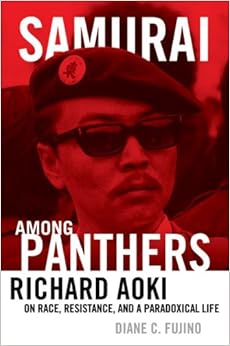
Last night, I finished Diane Fujino’s biography of Richard Aoki and wanted to write a quick note/review on it…
Because of its method, which is largely a presentation of Richard Aoki’s autobiographical oral history, the book is an odd mix of autobiography and biography. We read Aoki in first person talking about his parents breaking up in the internment camps, his time in the army, his involvement with the Socialist Workers Party, the Black Panthers, the Asian American Political Alliance, the Third World Liberation Front strike, and so on. Fujino then adds her own commentary at the end of each chapter (and throughout also has useful, extensive footnotes).
A few quibbles with this necessary and important work… While her method gives us a direct and a useful sense of Aoki’s style, the reliance on interview-transcription allows Aoki to guide and frame his story often to the detriment of context, and Fujino’s followup commentary often seemed more redundant than clarifying. As well, since the interviews were no doubt extensively edited for clarity (for a minor example Fujino says in one footnote that she added words to give a statement context; p 369, note 17) it would be informative to know more about this editing process.
Reading this in 2015, three years after the informant revelations, to say the obvious and easy: many episodes beg for reconsideration and revision. The book if nothing else is a continuous lesson in historiography.
Obviously much to chew over, but two things stay with me in particular. Whatever status he had, his almost play-by-play account of the TWLF strike at Berkeley was deeply moving. Even though I don’t really care to read tactical or military history–and Aoki’s accounting of the strike (the costliest in UC history) seems unique in that it focused mostly on such things–and even though I’m reading as someone partly already suspicious of his motives, Aoki’s palpable involvement and risk, as well as the investment and risk of so many others, to create a program of academics where they could self determine their own education, is astounding and very moving.
The other episode, and one that seems virtually unrelated to any stain due to his informant activity, is Aoki’s reaction to the riots after the Rodney King verdict. At this point he’s a college administrator and a colleague says to him, “Richard, how’s it feel? You know how to start riots. Now you’re getting paid to stop one.” It’s not a little disturbing to read him confronting that conflict, thinking about the trap he’s in as an employee of the state. Aoki’s assessment of the radical left’s losses as nearly total since 1968 is also familiar and familiarly disheartening.
_____________
PS Today, following up in the library, I read one of the more radical revisionist readings of Aoki’s informant activities. According to Black Studies professor and Aoki friend, Douglas Henry Daniels, being paid by the FBI (for assumed useless knowledge) was, “one of the earlier attempts to recoup remuneration for the internments…” Ha! I’ll take that for a dollar!

_________________
Other Aoki resources I found useful:
Momo Chang’s good summary of the revelations of Aoki’s informant activities and its aftermath.
The A-Files: Richard Aoki & the FBI, written by Aoki friends Belvin Louie & Miriam Ching Yoon Louie, discusses what it was like as close friends to hear and process the informant news.
Mostly behind a paywall, A Richard Aoki Forum: What Does It Take to Destroy a Legend? appeared in Amerasian journal and has responses by several Aoki supporters, including his close friend, long-time activist Harvey Dong.
Why Couldn’t Richard Aoki Have Been an Informant? by Tamara Nopper
And the excellent multi-part, in-depth coverage of Aoki in Hyphen Magazine by Momo Chang and others: Who Was Richard Aoki?
The Aoki documentary




























